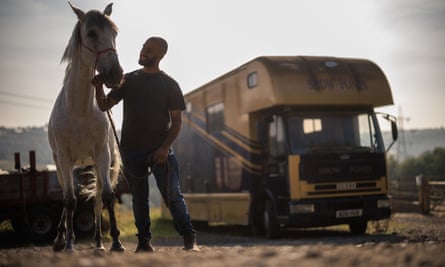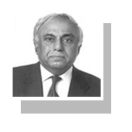Published in The Guardian on October 05, 2022
A remote field in Bradford rumbles as a rider, resplendent in a crisp white shalwar kameez, pistachio-coloured waistcoat, turban and fan billowing upwards like peacock feathers, gallops on his horse towards a peg hammered into the ground. As the rider thunders closer to his target he lowers a long lance, impaling the peg seconds later with a jubilant roar. “Four points, clap!” a commentator cries in Urdu.
Teams across the country – all from the Pakistani diaspora – have gathered to compete at a national competition for neza bazi, or tent pegging. It is a centuries-old cavalry sport renowned across south Asia that is becoming increasingly popular in the UK.
“Today, you’d think so many British Pakistanis have horses,” said Sohail Hussain, an enthusiast. “That’s only because we’re all from around the UK, and neza bazi is starting to get popular.”
The majority of British Pakistanis in West Yorkshire are from Mirpur in Pakistan-administered Kashmir. Tent pegging is hugely popular within this community. “Back home [in Pakistan], everyone’s got horses,” Hussain said. “My grandad, my great-great-grandad, they all were into horses.”
Some claim neza bazi’s origins date back to the time of Alexander the Great, or the Persian empire. But historical records pinpoint its practice to Indian cavalry during the British Raj, when it was used as a military tactic to attack tents.

“They would send their crack team of tent-pegging cavalry in to whip the pegs out, collapse the tents, create confusion,” said Jem Pearce, a spokesperson for the British Tentpegging Association. “They’d all be asleep and stuck inside the tents. Then, the infantry would finish them off, and they wouldn’t know what hit them.”
Adopted by the British cavalry in India, it eventually evolved into a competitive sport played in colonial gymkhanas, elite clubs that were once the heart of British social life in south Asia.
Today, tent pegging is an established military sport practised by the Household Cavalry Mounted Regiment of the British army. It even has its own world cup, with 27 October designated as the international day of tent pegging by the Oman-based International Tent Pegging Federation.
The sport takes skill and practice. “You have to hone your hand-eye coordination, your relationship with your horse,” said Pearce.
Hussain, a fraud investigator for the government, was introduced to the equestrian world by a fraternity of British-Pakistani enthusiasts.
He rents a stable at a farm in Batley that has a riding school for children, including those with physical and learning difficulties. There, Hussain and his friends have found support from the owners, as well as a sanctuary for their horses.
After shovelling the manure out of his stable, Hussain gleefully attempts to hug his horse Faaris (Urdu for “night”), a towering Spanish gelding. The summer has bleached Faaris’s normally glossy ebony coat a deep brown. “I always wanted a Lloyds TSB horse, and I got one,” Hussain said, breaking out into the opera aria from the advert.
“Animals are beautiful creatures, you get so much peace out of them,” he said. “With the way world is today and all the crazy stuff, you can come here and everything just slows down.”
When he bought a horse for the first time three years ago, Hussain and his friends struggled to find stables at the many white-British owned farms around neighbouring Batley, an experience he says was influenced by subtle racism.
He laughs as he recalls one farmer he stabled with who regarded him and his friends with suspicion. “A lot of us are hardworking lads, and we’ve got nice cars,” Hussain said. “But they thought that we were doing drugs in there or something.”

For Faisal Qadir, horse riding became a lifeline for his mental health when he tore his anterior cruciate ligament while playing football almost two years ago. “Horse riding has definitely helped me a lot,” he said. “It’s put my mind in a better place, and not just my mind. Physically, I’m a lot fitter.”
As he ushered a startled horse back into a trailer with a friend, Qadir added: “I’m so much calmer around horses.”
Qadir learned about tent pegging seven months ago, from a group of British Pakistani enthusiasts who were concerned about his mental health. It was not just his Pakistani heritage, but also the significance of horses in Saudi Arabia 1,400 years ago when a nascent Islam emerged, that also drew him to horses and eventually tent pegging.
“I never knew this sport existed,” he said. “The moment I saw what it is, I decided I had to be involved.”
At the competition in Bradford, horses glisten with gold embroidered saddles and reins sewn in Pakistan, pounding the ground restlessly as they prepare to gallop. Hooves jingle with the sound of bells as some perform the Spanish trot to the sound of dhol drums and a tutni flute, while the union jack, the Pakistani flag and the flag of Pakistan-administered Azad Kashmir flutter above the crowds.
“You could literally die doing that sport in a split second,” Hussain says. But for young British-Pakistani men like him, tent pegging is so much more than a sport. “It’s like I’ve unlocked something in my DNA that I was supposed to be doing,” he said.
… we have a small favour to ask. Millions are turning to the Guardian for open, independent, quality news every day, and readers in 180 countries around the world now support us financially.
We believe everyone deserves access to information that’s grounded in science and truth, and analysis rooted in authority and integrity. That’s why we made a different choice: to keep our reporting open for all readers, regardless of where they live or what they can afford to pay. This means more people can be better informed, united, and inspired to take meaningful action.
In these perilous times, a truth-seeking global news organisation like the Guardian is essential. We have no shareholders or billionaire owner, meaning our journalism is free from commercial and political influence – this makes us different. When it’s never been more important, our independence allows us to fearlessly investigate, challenge and expose those in power.




